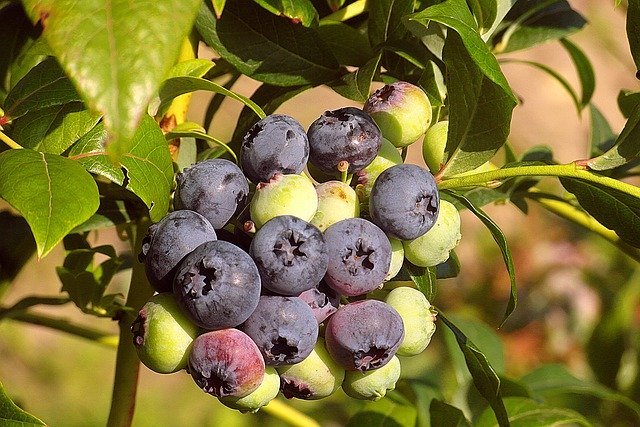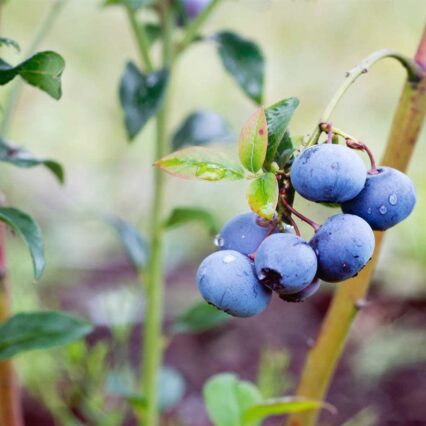Blueberries are a tasty, juicy fruit that is full of vitamin C and antioxidants.
Like lots of soft fruit, blueberries can be rather expensive to buy in the supermarket, so why not save yourself some pennies and grow them at home?

Blueberry pollination
If you just want to grow one blueberry bush, then choose a self-fertile variety. This means that it does not need another blueberry plant’s pollen in order to produce fruit. It should state on the plant label whether it is a self-fertile variety or not, and if it isn’t, you will need another blueberry bush to partner it, or several different varieties if you have the room.
Planting Blueberry Bushes
The thing to know about blueberry plants is that they like acidic soil. The acidity should be a pH value below 6, and there are many soil testing kits available to but if you want to see how acidic or alkaline your soil is.
A bit of preparation is needed if you want to plant blueberry bushes into your garden soil. Most soil in the UK will not be acidic enough, and will need something added to it.
Ericaceous compost, pine needles or untreated pine bark chippings should be well mixed in the soil before planting blueberry bushes. There is also the need to maintain the level of acidity by refreshing the acidic material each year.
The good news is that the roots of a blueberry bush are shallow, so adding in acidic material each year does not require lots of digging, once the plant is established. A good mulch of pine needles, or pine bark chippings, should do the trick.
A sunny position will help the plant produce sweet, large fruit.
Growing Blueberry Bushes in Pots
For easy planting, you cannot go wrong with a container. Blueberries are great to grow in containers, because you can just fill it with ericaceous compost and plant.
As the plant grows, it will need re-potting into larger containers. For a blueberry bush to mature and be productive, it will eventually need a 40 litre sized pot.
Caring for Blueberry Bushes
Growing blueberries requires little maintenance, other than making sure the soil has the right pH balance. If growing blueberries in the garden, check the pH levels each spring and add acid rich matter to the soil if required.
A mulch of pine bark chippings each spring will help to keep the acidity levels and also keep the moisture in the soil.
Pruning blueberry bushes should not be needed for the first two years, after that, just cut out some of the old wood to encourage new growth, or any wood that is damaged.
Water well in dry weather, and use natural rainwater whenever possible. This is because tap water tends to be alkaline.
Harvesting and Storing Blueberries
Pick blueberries in summer and autumn when they are a good size and a blue colour.
Blueberries keep fresh for a few days in a fridge, and they freeze well.
Grow more fruit and veg! A-Z Growing Guide

